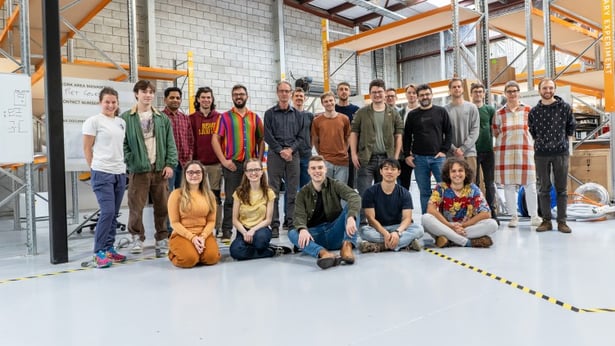A note on OpenStar, one of Icehouse Venture’s most ambitious startups.

The OpenStar team
Without the sun, we would have no food, no warmth, no plants (or fossil fuels), no tans, no sunset photos on Instagram, and no life on Earth.
Like all stars, the gaseous ball about 150 million kilometres away from us is a prolific source of energy, with reactions at the core flowing out as radiation from the surface and leading a range of essential chemical and physical processes on our planet. A Māori-led Kiwi start-up is essentially creating a small sun here in New Zealand that could also become essential for life on Earth. Meet the appropriately named OpenStar, which is on a mission to provide abundant, safe, carbon-free electricity through fusion and is one of Icehouse Ventures’ latest investments.
Fusion has long been touted as a solution to the world’s voracious demand for energy and our need to reduce carbon emissions. Global fossil fuel emissions are set to reach a record high this year, despite ongoing attempts to reduce them. And as we look to decarbonise transport and industrial processes, demand for electricity is expected to increase significantly if we hope to reach net zero targets by 2050. The clock is ticking.
Research into fusion has been pursued globally for decades both through public partnerships like the International Thermonuclear Experimental Reactor in France and, more recently, through privately funded enterprises like Commonwealth Fusion Systems. But, as you might expect, creating a mini-sun on Earth is quite hard - and, given the core of the sun is around 15 million degrees centigrade, very hot. While researchers have taken promising steps recently, no fusion reactors have been developed where the energy usage and economics stack up - yet.
The highly ambitious team of 27 at OpenStar hopes to change that, using a large, high-temperature superconducting magnet to confine a super-hot plasma reaction of hydrogen isotopes to generate power. The company is in the early stages of its research and development efforts and the current funding round is intended to provide capital for the next 12 months to demonstrate technical progress. OpenStar and Icehouse Ventures believe that the pursuit of fusion energy is well aligned with the promotion of positive environmental and social outcomes, as well as being economically scalable.
Ratu Mataira is the founder of OpenStar. Ratu completed his PhD in Applied Superconductivity, specialising in No-Insulation HTS Coils and Superconducting Power Supply Technologies. By the end of his PhD he had set the bar as the most prodigious student to graduate Robinson Research Institute, the world leader in such technologies. Ratu’s academic success and commercial networks resulted in multiple offers to take up CEO roles in New Zealand Start-ups, but ambition leads the way, and if we have a shot at making fusion work, that’s where you’ll find Ratu.
“I come from a family of educators. My grandmother, Dame Kāterina Mataira, received her knighthood for saving Te Reo Māori from extinction after a century of colonisation. If she could do that, what is the measure of what you can do in a single life? For our generation – for my life – that challenge is climate change and the future of human prosperity. Fusion itself is only a technical solution, but these problems are more than technical. Saving Te Reo Māori wasn’t done via an app, AI, or government intervention – it was done by people coming together with a sense of responsibility, courage, and hope to protect what was most important to them. That’s OpenStar, and that’s me.”
- Ratu Mataira
Imagine if a New Zealand start-up was able to create energy to solve one of the world’s thorniest problems? If OpenStar succeeds in its quest to create a near-limitless, clean energy source, there are likely to be big financial benefits for investors, but the biggest benefit of all is that we humans won’t need to keep crapping in our own nest by burning fossil fuels and will be able to remain on our favoured planet for a while yet, at least until the actual sun stops pumping out heat and light in five billion years or so. And it’s pretty hard to put a price on that.
